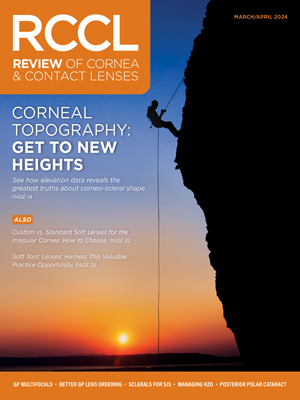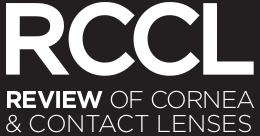In recent years, we have seen a growing number of health care-related websites and apps have opened the door for self-diagnosis and treatment, often giving the general public the false perception that they can forgo visiting a medical professional. In an era where convenience and cost tend to be given more weight than quality care, this trend has accelerated, especially since the pandemic and a further shift away from in-person services.
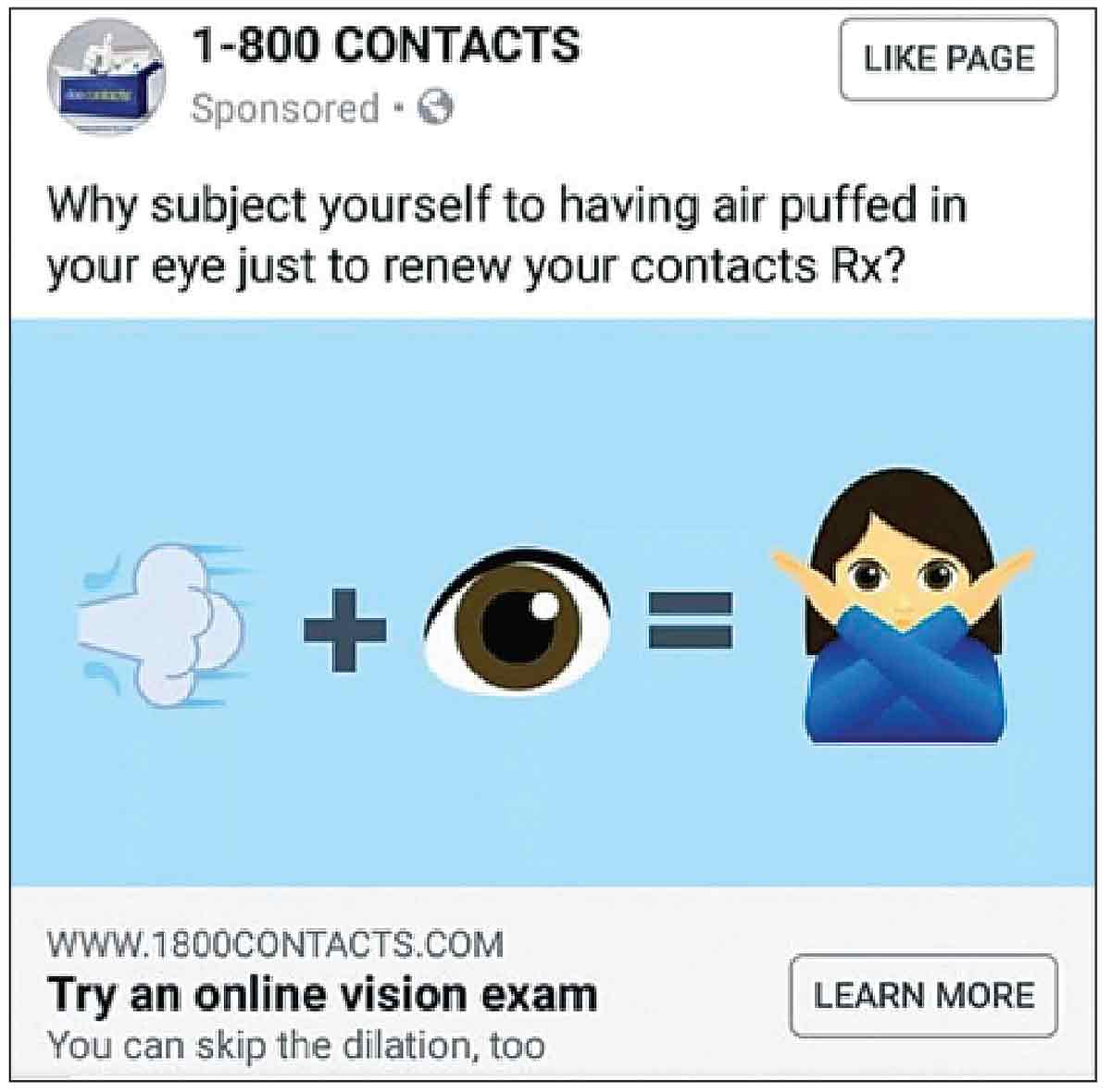 |
| This is an example of a Facebook advertisement used by 1-800 CONTACTS to promote the company’s online contact lens prescription renewal platform. Click image to enlarge. |
For optometric practice, this perfect storm exacerbated an already significant challenge: online contact lens sellers. During the COVID-19 shutdown, these companies saw a massive influx of consumer interest. 1-800 CONTACTS, for example, reported a 100% year-over-year increase in new and returning customers. Additionally, the company’s ExpressExam app had a 200% usage increase and its Rx Reader app had a 700% increase in monthly active users.1
During this time, other online sellers also ramped up the promotion of their prescription renewal services, using their ability to duplicate old prescriptions to bypass the doctor.1 Now, these retailers are appealing to the general public’s desire for convenience by not only marketing these services but also encouraging consumers to skip the in-office eye exam altogether.
“This is a war of truth vs. profits,” says Jeffrey Sonsino, OD, of Nashville. “Online retailers funded by private equity companies are simply trying to make a dollar off of contact lens patients with no regard whatsoever for their health and safety.” Dr. Sonsino says in their marketing, they take doctors out of the equation when it comes to safeguarding patients’ health and discourage in-person exams that can prevent vision loss from improperly fit lenses, instead offering non-FDA approved online vision tests. “It’s simply inexcusable and an example of a corporate interest for profit with blatant disregard for the safeguards that keep patients healthy.”
See Something? Say SomethingA crucial component of ongoing efforts to contend with the abusive behavior of online contact lens sellers depends on individual ODs shedding light on issues they come across in practice. For instance, if you have a patient come in who is dealing with complications that are a direct result of these behaviors, take the time to report the problem. This helps advocacy groups collect the necessary data and ensures these sellers can be held accountable. Simply follow the steps below: Visit the MedWatch webpage: www.fda.gov/safety/medwatch-fda-safety-information-and-adverse-event-reporting-program
|
Optometrists have been calling attention to the abuses of these companies for years, highlighting the threat their predatory practices pose to patient safety. It can be frustrating to witness the blatant undermining of not only the patient-doctor relationship, but also the critical role ODs play in eye care. However, as technology continues to improve and expand, so will the market for online vision correction. And so, optometrists must be prepared to address this issue head-on to protect both their practices and the patients they serve.
Where The Issue Stands
As the contact lens market continues to evolve, so does the legislative and regulatory landscape. The Fairness to Contact Lens Consumers Act and the subsequent Contact Lens Rule imposed responsibilities on both prescribers and sellers of contact lenses. While optometrists have complied, based on the few complaints to date, the same cannot be said for most contact lens sellers.2
In 2020, the Federal Trade Commission (FTC) revised the rule to include the following requirements:3
• Ask patients to acknowledge receipt of the contact lens prescription by signing a separate document.
• Ask patients to sign a prescriber-retained copy of the prescription that includes a statement confirming patient receipt.
• Include a statement confirming the patient received the prescription on the exam sales receipt and ask that they sign a copy.
• Provide the patient with a digital copy of the prescription and retain evidence that it was sent, received or made accessible.
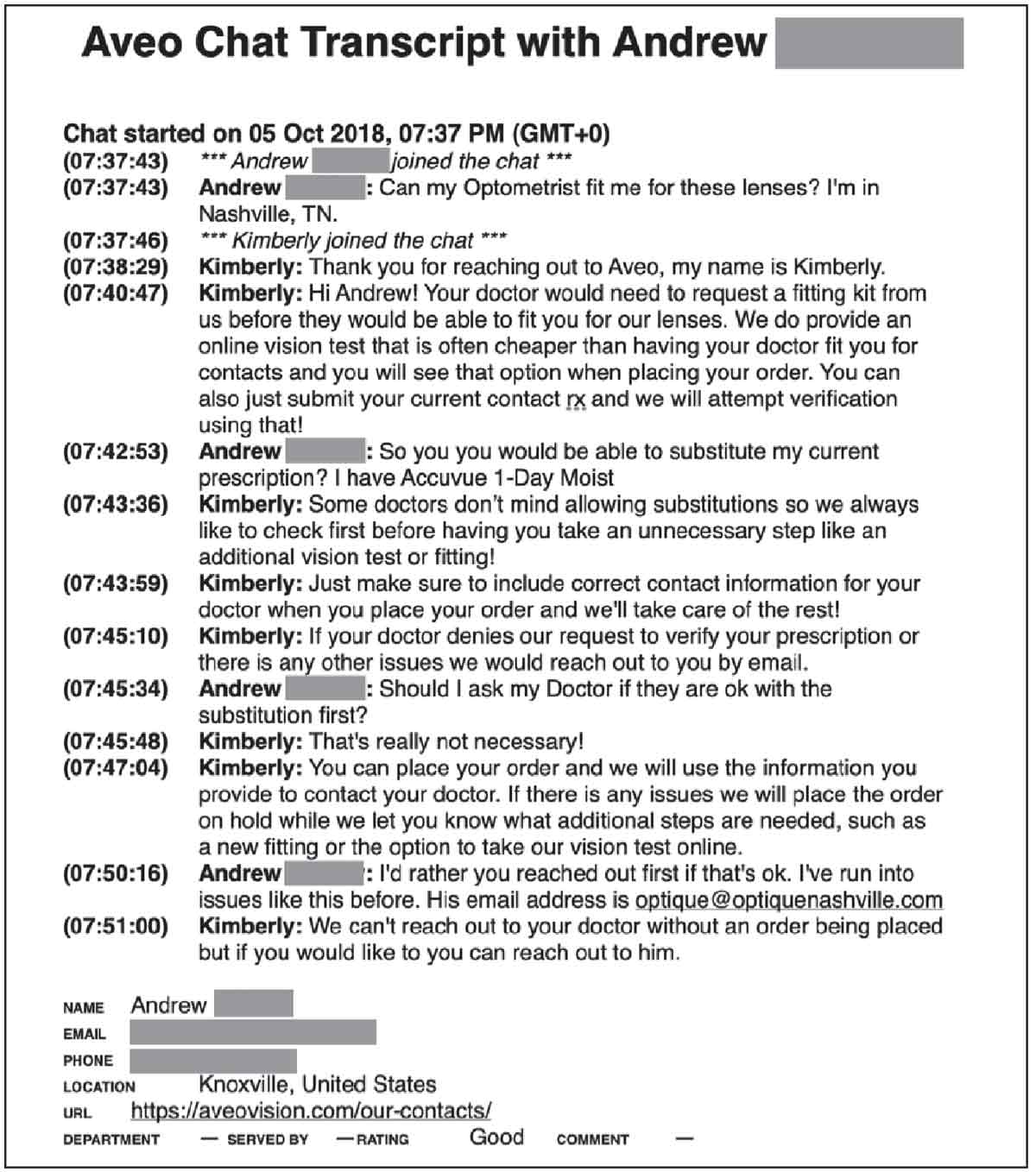 |
| Read this transcript of an interaction between a patient and direct-to-consumer contact lens company Aveo. Click image to enlarge. |
These changes—which place additional burdens on prescribers without addressing the ongoing issues surrounding direct-to-consumer contact lens sellers—went into effect one year ago, despite opposition from the optometric profession.
While these developments can be frustrating—and efforts to change them continue—progress has been seen in recent months. Amid growing concerns that regulatory oversight may be lacking, a group of US Congress members called for a federal review of direct-to-consumer prescription medical device practices.4
Additionally, on Jan. 28, 2022—just weeks after the Government Accountability Office accepted this Congressional call to review federal regulations—Hubble Contacts received a $3.5 million penalty from the Department of Justice and FTC for fraudulent business practices and repeated violations of the Fairness to Contact Lens Consumers Act, the Contact Lens Rule and the FTC Act.5
Dr. Sonsino applauds the FTC for this action, while noting that it remains to be seen how closely they will enforce Hubble’s flawed business model of not requiring a prescription. “I would like to see the FTC impose the same fines and sanctions against online resellers of contact lenses who are just as guilty of exploiting passive verification rules,” he adds.
“This settlement marks an increased enforcement of current regulations, and it is our hope that the FTC will continue to do so equitably and correctly,” notes Clarke Newman, OD, of Dallas, while emphasizing the importance of these efforts for patient safety. “Enforcement of these regulations is imperative and, as optometrists, we need to continue to comply, despite our concerns. We as a profession may not agree with every aspect of the rule, but it is important to try and support it, while also advocating for continued change.”
Advocacy Efforts
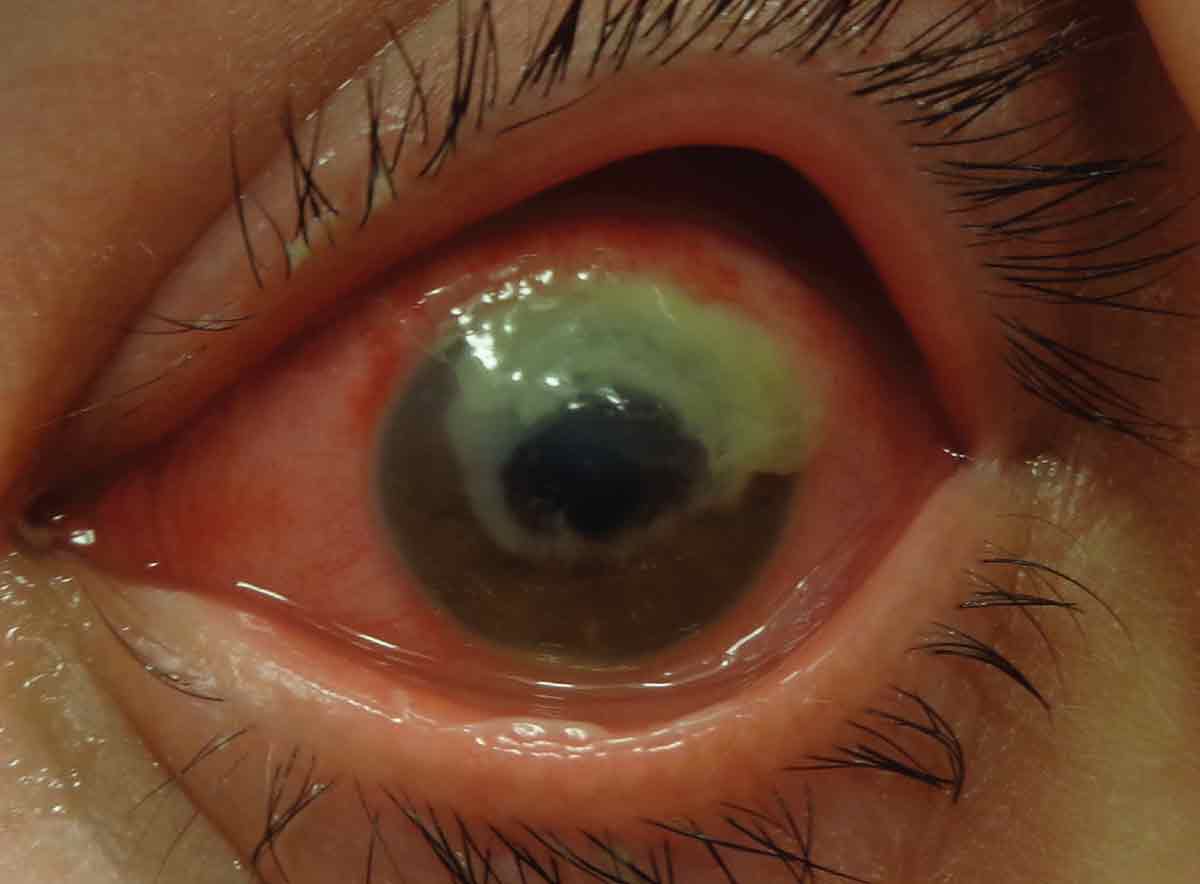 |
| This patient suffered a corneal perforation due to a Pseudomonas ulcer from ordering contact lenses online without doctor oversight. Click image to enlarge. |
The prioritization of convenience and lower costs, coupled with the power of online advertising and misinformation, can make connecting with patients a difficult and sometimes frustrating experience. However, elevating the patient-doctor relationship is crucial, especially when others in the industry are actively trying to minimize its value.
This can be accomplished by not only building strong relationships with your patients and community, but also through the support of advocacy for the optometry profession as a whole. Leading the charge is the American Optometric Association (AOA), whose ongoing efforts seek to ensure the fair treatment of optometrists as well as the safety of their patients.
Supporting the AOA and other organizations is one way ODs can lend their voice to the cause, suggests Dr. Newman. “In addition to complying with the current laws, optometrists can also help make a difference in ongoing efforts to address the issue of online contact lens sellers and related legislation.”
This includes the Contact Lens Rule Modernization Act, introduced to the Senate in September 2020, which is backed by the AOA as well as the Health Care Alliance for Patient Safety, which was founded in 2018 to advocate for patient safety and protect the doctor-patient relationship. This bill seeks to eliminate contact lens prescription verification robocalls as well as the FTC’s recent revisions that require prescribers to get signed acknowledgment forms confirming patients received their contact lens prescriptions.6,7
“Our goal is to support this bill and try to get it passed because it will greatly improve the processing and further curtail some of the abuses of online sellers,” Dr. Newman notes, while underscoring the importance of individual ODs participating in this effort.
Legislative and regulatory work is bolstered when optometrists share what they are witnessing firsthand in clinical practice, according to Andrea P. Thau, OD, AOA past president, who advises ODs to report any issues they observe directly to the AOA. “If a doctor believes a retailer is not adhering to patient safety laws, it is vital that they report it,” she says. “When advocacy groups are speaking with regulators, specific examples help them wrap their heads around what is happening and the true scope of the problem.”
Strategies for ODs
Contending with online sellers remains a challenge for optometrists; however, there are ways to tackle these issues in clinical practice. It begins, according to San Diego’s Brian Chou, OD, by recognizing that they cannot compete strictly on price.
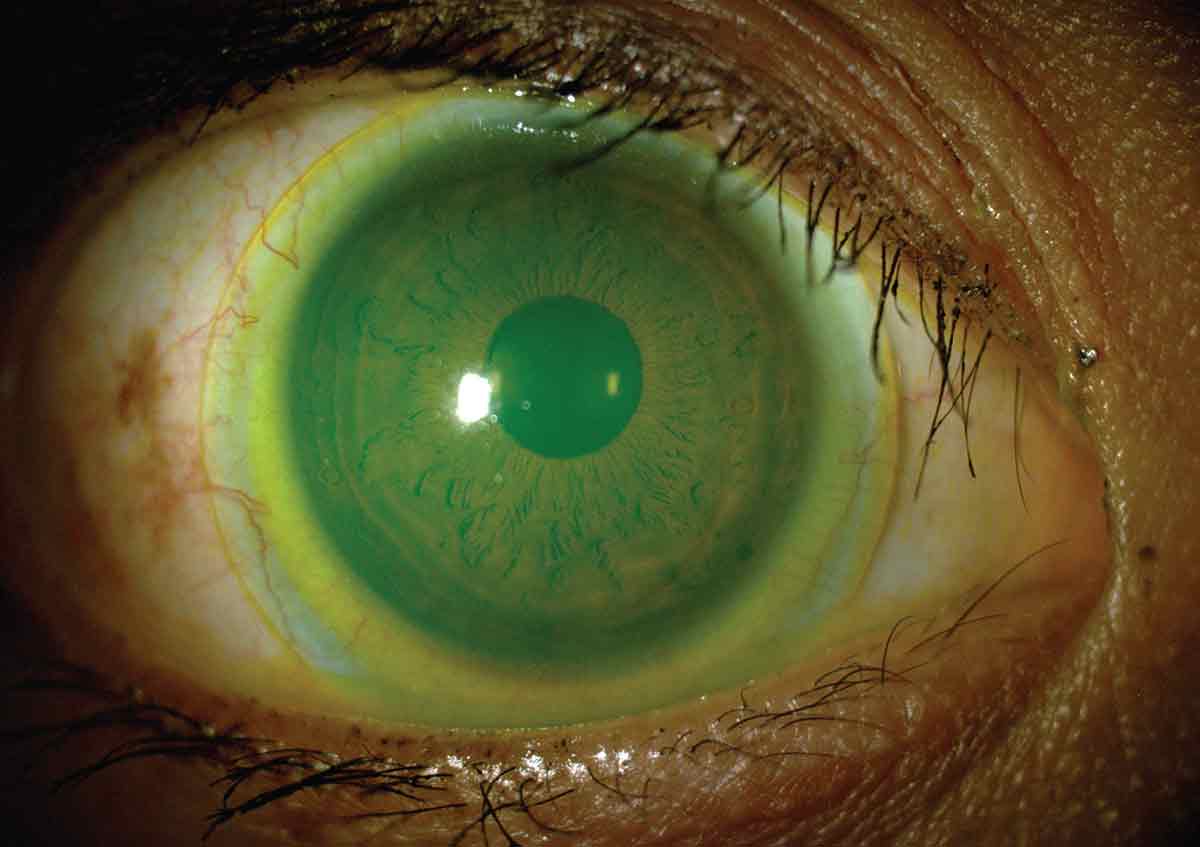 |
| A specialty lens, such as this mini-scleral, may be a good option for your patient with high corneal astigmatism—and one only you can prescribe. Click image to enlarge. |
“Our core competency is the service we provide,” he explains. “There is no way that online retailers who use a remote model can compete in this space when it comes to quality eye care, clinical decision making and human connection.”
Emphasizing your expertise can be as simple as changing the language used for the services you provide, suggests Dr. Chou. For instance, instead of “contact lens fitting,” use the phrase “contact lens evaluation and prescribing” to better convey the value you provide to your patients. It is also important, he notes, to charge an appropriate fee for your time that reflects your worth as an optometric professional.
Take the time to educate your patients, Dr. Sonsino says. “When you are performing tests in the office, explaining every one you perform in front of the patient assigns a value to your service,” he says. “When your patients don’t understand what you are doing and you don’t explain it, they won’t have an accurate understanding of what that service is worth.
“When you’re looking at blood vessels in the slit lamp, take the time to say, ‘I’m looking at these blood vessels to see how they’re responding to your contact lens wear, and if we see vessels growing where they shouldn’t be, we will change your contact lens material,’” Dr. Sonsino elaborates. “That simple statement shows the patient that you’re looking for something that is going to keep them safe.”
“It is important to reinforce to the patient that eyeglasses and contact lenses are medical devices that come with associated benefits and risks, and you might not receive the same quality from online retailers,” adds Dr. Thau. “We also emphasize the need for comprehensive eye exams to ensure that they not only receive the right contact lenses, but also for their overall health and well-being.”
Other ancillary strategies ODs can employ to offer more convenience and cost savings to their patients include subscription services and manufacturer rebates. Additionally, most manufacturers offer free shipping when a patient orders a yearly supply. Dr. Thau’s practice takes it one step further by offering replacement diagnostic or trial lenses when needed.
For example, if a patient is short a few lenses prior to their comprehensive eye exam, they will help bridge the gap. Or, if they need to change the prescription or fit before the year is out, Dr. Thau and her practice will exchange any sealed boxes at no charge.
“Going the extra mile for your patients can have a significant impact,” she says. “It’s our mission as doctors of optometry to protect, preserve, enhance and rehabilitate vision and we take that challenge very seriously.”
Seeing patients suffer due to companies who don’t have their health, safety and best interests in mind, and with the sole intention to make money, is exceptionally upsetting, Dr. Thau notes.
“I encourage every OD to find a way to be actively involved in this fight for both our patients and the profession,” she concludes.
1. Chou B. How COVID-19 is reshaping optometry. Rev Optom. 2020;157(10):38. 2. Shovlin J. The FTC’s One-Two Punch. Rev Cornea & Contact Lenses. 2020;157(4):6. 3. Federal Trade Commission. FTC Announces Final Amendments to the Agency’s Contact Lens Rule. www.ftc.gov/news-events/news/press-releases/2020/06/ftc-announces-final-amendments-agencys-contact-lens-rule. 2020. Accessed March 23, 2022. 4. American Optometric Association. U.S. House, consumer groups mull federal action against DTC contact lens sales schemes. 2021. www.aoa.org/news/advocacy/federal-advocacy/us-house-consumer-groups-mull-federal-action-against-dtc-contact-lens-sales-schemes?sso=y. Accessed March 23, 2022. 5. American Optometric Association. Hubble Contacts slapped with $3.5 million penalties, restrictions and supervision. 2022. www.aoa.org/news/advocacy/federal-advocacy/hubble-contacts-slapped-with-35-million-penalties-restrictions-and-supervision?sso=y. Accessed March 23, 2022. 6. American Optometric Association. Contact Lens Rule Modernization Act introduced in the U.S. Senate. 2020. www.aoa.org/news/advocacy/federal-advocacy/contact-lens-rule-modernization-act-introduced-in-the-us-senate?sso=y. Accessed March 23, 2022. 7. S.4613 - Contact Lens Rule Modernization Act. www.congress.gov/bill/116th-congress/senate-bill/4613/. Accessed March 23, 2022. |
